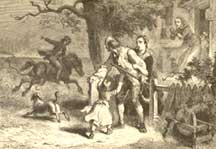Massachusetts became the focal point of opposition to British imperial policies for two reasons. First, the greater Boston area was a major commercial center and was naturally sensitive to all efforts to regulate trade. Second, the colony was home to a large number of radicals who ranged from the obstreperous Samuel Adams to the intellectual John Adams.
 The first great outburst of colonial indignation came during the Stamp Act crisis in 1765, during which the cry of “no taxation without representation” was heard. The ensuing quiet was broken by resistance to the Townshend Duties in 1767. Radical colonists fanned public furor following the Boston Massacre in 1770 and plotted the destruction of private property in the Boston Tea Party in 1773. British officials responded by closing the port of Boston in 1774.
Armed hostilities broke out in April 1775 at Lexington and Concord, and continued at Bunker Hill. Much of the early military action took place in Massachusetts until the focus of the war later shifted to New York, Pennsylvania and New Jersey.
The first great outburst of colonial indignation came during the Stamp Act crisis in 1765, during which the cry of “no taxation without representation” was heard. The ensuing quiet was broken by resistance to the Townshend Duties in 1767. Radical colonists fanned public furor following the Boston Massacre in 1770 and plotted the destruction of private property in the Boston Tea Party in 1773. British officials responded by closing the port of Boston in 1774.
Armed hostilities broke out in April 1775 at Lexington and Concord, and continued at Bunker Hill. Much of the early military action took place in Massachusetts until the focus of the war later shifted to New York, Pennsylvania and New Jersey.